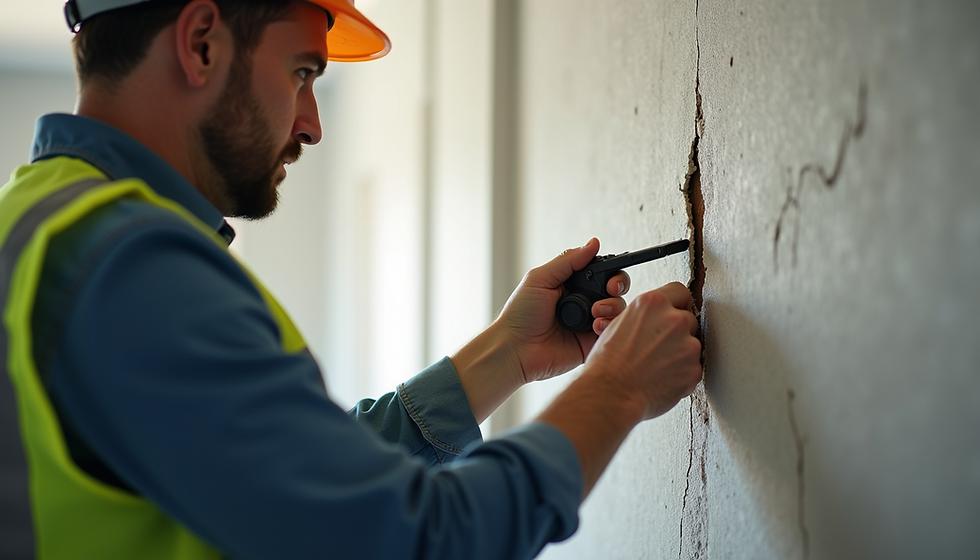Key Benefits of Regular Inspections for Commercial Properties
- John Gallagher
- Apr 28, 2025
- 3 min read
Regular inspections are an essential aspect of maintaining commercial properties. They help ensure the safety, longevity, and efficiency of buildings. By implementing a consistent inspection schedule, property owners can avoid costly repairs, maintain tenant satisfaction, and comply with regulations. In this blog post, we will explore the key benefits of regular inspections for commercial properties and why they are crucial for property management.
Importance of Commercial Inspections
Regular commercial inspections play a vital role in the overall maintenance strategy. These inspections not only help in identifying existing problems but also in preventing potential issues. Real estate professionals agree that consistent inspections contribute to enhanced property value and performance.
Imagine a commercial property manager who skips inspections for a few years. Over time, minor issues like a leak can turn into significant damage, costing thousands of dollars and impacting the business's productivity.

What is a Commercial Inspection?
A commercial inspection is a thorough examination of a commercial property to assess its condition and ensure compliance with safety regulations. This process can involve various components, including:
Structural integrity
Electrical systems
Plumbing
HVAC (Heating, Ventilation, and Air Conditioning)
Safety Inspection
Roof / Building Envelope
The goal is to identify any potential hazards or areas that need immediate attention. A qualified inspector conducts these evaluations, providing a detailed report highlighting any existing or potential issues.
Regular inspections allow property owners to address minor issues before they escalate, ensuring the safety of tenants and employees.
Preventing Costly Repairs
One of the most significant advantages of regular inspections is the ability to prevent costly repairs. Routine check-ups can catch small issues early—like a rusting pipe or worn-out roofing materials—before they become major problems requiring extensive and expensive repairs.
For instance, failing to regularly inspect a building's HVAC system can lead to significant malfunctions. According to the U.S. Department of Energy, improper maintenance can reduce cooling and heating efficiency by 30%. By scheduling regular inspections, property owners can maintain their HVAC systems, leading to lower utility costs and enhanced energy efficiency.

Enhancing Tenant Satisfaction
Tenant satisfaction is crucial for the success of any commercial property. When tenants are content, they are more likely to renew their leases, pay rent on time, and refer others to the property. Regular inspections demonstrate a commitment to maintaining the property and upholding a safe and comfortable environment.
For example, routine inspections can help detect any potential safety hazards. Furthermore, timely address of maintenance issues results in fewer inconveniences for tenants.
With clear communication and periodic inspections, property managers can foster a positive relationship with tenants, contributing to a cooperative environment.
Complying with Regulations
Commercial properties are often subject to various local, state, and federal regulations. Regular inspections help ensure compliance with these regulations, which can significantly reduce the risk of legal issues and costly fines.
For example, specific properties must adhere to the Americans with Disabilities Act (ADA) standards, which require features like accessible entrances, signage, and restrooms. Regular inspections will help identify areas of non-compliance, allowing property owners to make necessary adjustments before any legal repercussions arise.
In addition to building codes, regular inspections encompass fire safety requirements, ensuring that all safety equipment is up to date, and that emergency exits are clear and properly marked.

Increasing Property Value
Regular inspections contribute to the overall upkeep of a commercial property, which can enhance its value. A well-maintained building with updated systems is more attractive to potential buyers and tenants. By identifying and addressing issues promptly, property owners can prevent minor problems from turning into major headaches that diminish property values.
Moreover, properties that have a documented history of regular inspections often command a higher price in the market. Investors seek properties with fewer maintenance concerns, making regular inspections a valuable part of any property management strategy.
Conclusion
In summary, regular inspections are an integral part of managing commercial properties. They prevent costly repairs, enhance tenant satisfaction, ensure compliance with regulations, and help maintain or increase property value. Investing in "commercial property inspections" find out more about inspections here will ultimately save property managers time and money while creating a safer and more appealing environment for tenants. Make inspections a priority in your property management strategy and watch your investments flourish.




Comments